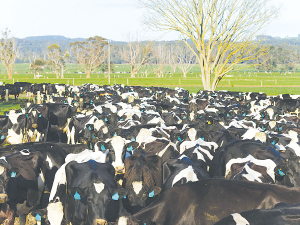Editorial: Happy days
OPINION: The year has started positively for New Zealand dairy farmers and things are likely to get better.
 Sales of veterinary and horticultural antibiotics in New Zealand have decreased for a fifth year in a row.
Sales of veterinary and horticultural antibiotics in New Zealand have decreased for a fifth year in a row.
Total sales of veterinary and horticultural antibiotics in New Zealand have decreased for a fifth year in a row, dropping by 23% in 2022.
The drop was a key finding of the ‘2022 Antibiotic Agricultural Compound Sales Analysis’ released last week by New Zealand Food Safety (NZFS). The report summarises the trends in the annual sales of veterinary and horticultural antibiotics as part of a national action plan to reduce antimicrobial resistance (AMR).
“The World Health Organisation has identified AMR as one of the top 10 global health threats facing humanity, so seeing a 23% drop in the sale of antibiotics for plants and animals is good news,” says NZFS deputy director- general Vincent Arbuckle.
“Antibiotics are antimicrobial medicines essential to the health of humans, animals, and plants, but using them excessively can lead to the emergence of resistant bacteria that don’t respond to antibiotic treatment.
“With AMR increasing around the world, and few new antibiotics being developed, careful use of the antibiotics we have will help to keep them effective.”
Of the 16 classes of antibiotics NZFS monitors, five are critically important for human health, meaning they should be considered the last line of defence in animal infections.
“We found that the total sales of antibiotics critical for human health decreased by 8% in 2022 to 6285kg. This is the lowest they’ve been since 2017, when 8952kg of antibiotics critically important to human health were sold,” says Arbuckle.
“Overall, the sale of antibiotics has dropped from 71,361kg in 2017 to 41,033kg in 2022. That’s a drop of 42%.
“The ongoing decrease in the use of antibiotics can be put down to a concerted effort from industry and NZFS to ensure these important medicines are used appropriately.
“The continued vigilance of veterinarians, farmers and other industry stakeholders, as well as our ongoing monitoring and support, are an effective way to minimise the incidence of AMR.
“We are also reviewing our regulatory oversight of antibiotics used in plants and animals, which could lead to a further reduction in antibiotic use as controls for some antibiotics might be tightened. This extensive piece of work has a five-year timeframe as it involves reviewing hundreds of antibiotic products.”
In 2017, the New Zealand Antimicrobial Resistance Action Plan was jointly developed by the Ministry of Health, New Zealand Food Safety and representatives from across the human health, animal health and agriculture sectors.
Its vision is for New Zealand to manage antimicrobials as a valuable shared resource and to maintain their efficacy so they can be used to treat infections in humans, as well as to manage diseases in animals and plants. An update to the action plan is due to be released next year.
Fonterra’s impending exit from the Australian dairy industry is a major event but the story doesn’t change too much for farmers.
Expect greater collaboration between Massey University’s school of Agriculture and Environment and Ireland’s leading agriculture university, the University College of Dublin (UCD), in the future.
A partnership between Torere Macadamias Ltd and the Riddet Institute aims to unlock value from macadamia nuts while growing the next generation of Māori agribusiness researchers.
A new partnership between Dairy Women’s Network (DWN) and NZAgbiz aims to make evidence-based calf rearing practices accessible to all farm teams.
Despite some trying circumstances recently, the cherry season looks set to emerge on top of things.
Changed logos on shirts otherwise it will be business as usual when Fonterra’s consumer and related businesses are expected to change hands next month.